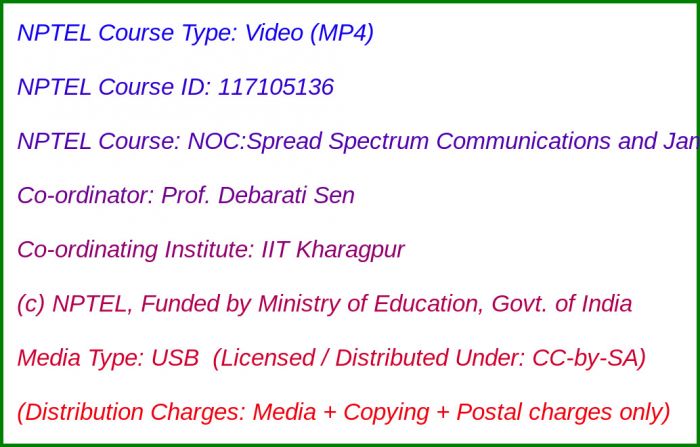NOC:Spread Spectrum Communications and Jamming (USB)

Media Storage Type : 32 GB USB Stick
NPTEL Subject Matter Expert : Prof. Debarati Sen
NPTEL Co-ordinating Institute : IIT Kharagpur
NPTEL Lecture Count : 69
NPTEL Course Size : 16 GB
NPTEL PDF Text Transcription : Available and Included
NPTEL Subtitle Transcription : Available and Included (SRT)
Lecture Titles:
Lecture 1 - Introduction to Spread Spectrum Communication
Lecture 2 - Direct Sequence Spread Spectrum System
Lecture 3 - Performance Analysis of DSSS
Lecture 4 - Concept of Jamming Margin
Lecture 5 - Frequency Hopping Spread Spectrum System
Lecture 6 - Tutorial-1
Lecture 7 - Slow and Fast Frequency Hopping
Lecture 8 - Hybrid Spread Spectrum System and Time Hopped SSS
Lecture 9 - Spread Sequences and Waveforms
Lecture 10 - Generation Mechanism of ML Sequence
Lecture 11 - Properties of Spread Spectrum Sequences
Lecture 12 - Tutorial-2
Lecture 13 - Power Spectral Density of ML Sequence
Lecture 14 - Walsh Hadamard Code and Properties
Lecture 15 - Generation Mechanism and Properties of OVSF and Barker Codes
Lecture 16 - Generation Mechanism and Properties of Gold and Kasami Codes
Lecture 17 - Performance Analysis of DSSS in Presence of Tone Jamming
Lecture 18 - Performance Analysis During Generation Tone Jamming
Lecture 19 - Performance Analysis in Presence of Gaussian Interference
Lecture 20 - Performance Analysis of a Quaternary System
Lecture 21 - Despreading with Matched Filter
Lecture 22 - Noncoherent Systems
Lecture 23 - Tutorial - III
Lecture 24 - Galois Field Mathematics
Lecture 25 - Galois Field Mathematics (Continued...)
Lecture 26 - Galois Field Mathematics (Continued...)
Lecture 27 - Polynomials over Binary Field
Lecture 28 - Long Nonlinear Sequence Generation
Lecture 29 - Rejection of Narrowband Interference
Lecture 30 - Narrow Band Interference Cancellation by Transform Domain Processing
Lecture 31 - PN Code Acquisition Fundamentals
Lecture 32 - Performance Analysis of PN Code Acquisition System - Part I
Lecture 33 - Performance Analysis of PN Code Acquisition System - Part II
Lecture 34 - Tutorial - IV
Lecture 35 - Rapid Acquisition Using Matched Filter - Part I
Lecture 36 - Rapid Acquisition Using Matched Filter - Part II
Lecture 37 - Active Search Acquisition for FFH/MFSK Signals
Lecture 38 - Active Search Code Acquisiton for FFH/MFSK Analysis
Lecture 39 - Detection Probability Analysis of Code Acquisition for FFH / MFSK
Lecture 40 - Tutorial - V
Lecture 41 - DSSS Tracking
Lecture 42 - FHSS Synchronization Method - I
Lecture 43 - FHSS Synchronization Method - II
Lecture 44 - FHSS Synchronization Method - III
Lecture 45 - FHSS Tracking
Lecture 46 - Tutorial - VI
Lecture 47 - Concept of Fading for Wireless Communications
Lecture 48 - Diversity for Fading Channels
Lecture 49 - Rake Receiver
Lecture 50 - Performance Analysis of Rake Receiver
Lecture 51 - Spread Spectrum Multiple Access
Lecture 52 - Tutorial - VII
Lecture 53 - Introduction to CDMA
Lecture 54 - Interference Handling Mechanism in CDMA Networks
Lecture 55 - Interference Handling by Soft Handover
Lecture 56 - Interference Handling by Smart Antenna
Lecture 57 - Multiuser Detection and Interference Cancellation
Lecture 58 - Tutorial - VIII
Lecture 59 - Multiuser Detection - Part I
Lecture 60 - Multiuser Detection - Part II
Lecture 61 - MUD - Probability of Error
Lecture 62 - IS95 and CDMA - Part I
Lecture 63 - IS95 and CDMA - Part II
Lecture 64 - Tutorial - IX
Lecture 65 - WCDMA and UMTS - Part I
Lecture 66 - WCDMA and UMTS - Part II
Lecture 67 - LPI Communications
Lecture 68 - Radiometer
Lecture 69 - Interceptor Detectors

